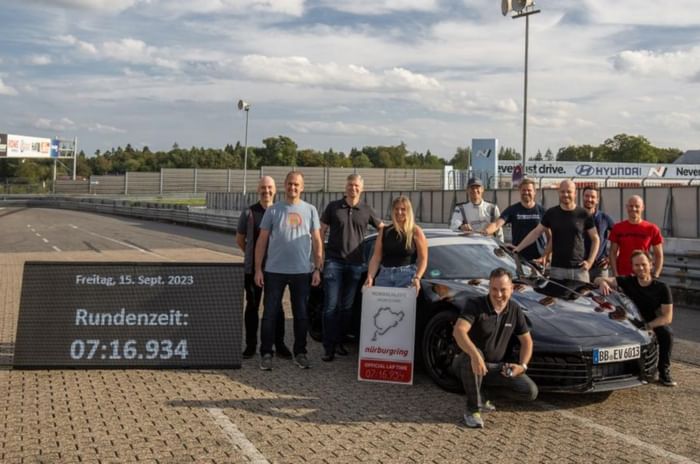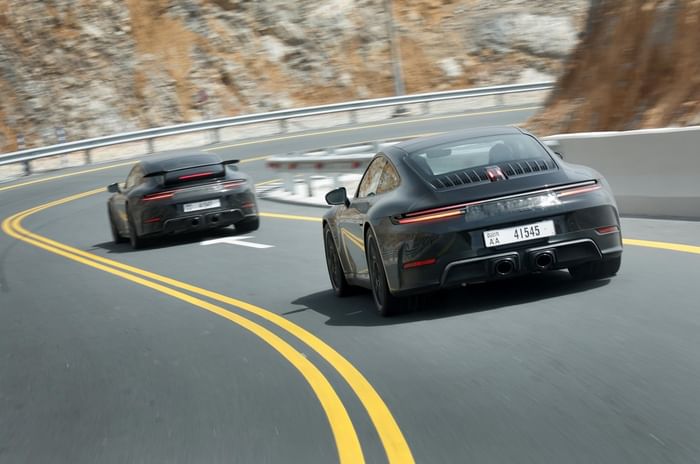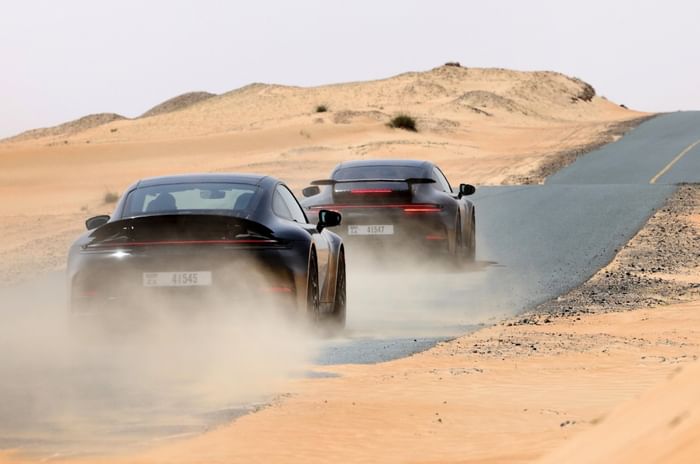The new Porsche 911 hybrid has finished testing ahead of its reveal on May 28. Porsche has released the first official images of the electrified 911 as the global testing programme comes to an end, and confirmed that it has clocked a Nurburgring lap time of 7min 16.934secs. That time, says Porsche, is 8.7sec faster “than the corresponding version of the predecessor model”, but it didn't say specifically which model that refers to.
For reference, the current Porsche 911 Turbo S, with 650hp and a 0-100kph time of just 2.6sec, clocked a lap time of 7min 17.3sec in 2021; less than a half a second behind the new hybrid.
- Porsche 911 hybrid tested for over 48 lakh km
- Hybrid to join 911 facelift (992.2) line-up
- No 911 EV planned

Details of the precise nature of the 911's hybrid system remain under wraps until the end of the month, but Frank Moser, who heads the 911 and 718 model lines, said it's an “innovative performance hybrid” system that gives “spontaneous response” and “makes the 911 even more dynamic”.
“We left nothing to chance during development and tested the new 911 under all sorts of conditions all over the world,” he added. “From the freezing cold to scorching heat. Whether at a high drivetrain load in the demanding conditions of mountain passes or in the stop-and-go traffic of an urban environment, the new 911 has mastered even the most difficult challenges with aplomb.” During testing, said Moser, engineers and test drivers clocked up more than 48 lakh km behind the wheel of the prototypes.
The hybrid will be added to the line-up as part of a mid-life facelift for the current 911; the ‘992.2’-gen car will receive a host of mid-life revisions, including subtly altered exterior styling, a reworked interior and updated six-cylinder petrol engines. It is one of four new Porsche models arriving in 2024 – one of the German marque's busiest years on record for new product launches – alongside the new Panamera, Taycan and electric Macan.
The changes are intended to sustain the 911’s appeal through to 2027, when an all-new ninth-generation model will join the increasingly electrified Porsche line-up. The most significant change to the 911 in its sixth decade of production is the adoption of the hybrid system. It combines a tuned version of Porsche’s turbocharged six-cylinder engine with a specially designed electric motor housed within the front axle assembly. The petrol engine provides drive to the rear wheels, while the electric motor drives the front wheels.
The new 400V system is claimed to generate its own energy reserves using the engine as a generator – in a function similar to that of a range-extender drivetrain – as well as via brake regeneration, negating the need for external charging.

Electric energy is stored in a specially developed lightweight lithium-ion battery. With an energy capacity well below the batteries used by Ferrari and Mercedes-AMG in their plug-in performance models, it has been configured specifically for rapid energy charge and discharge.
Secrecy surrounds the output of the new hybrid drivetrain, though Porsche is eventually expected to offer it in a range of different performance levels. Both Turbo-E Hybrid and Turbo S E-Hybrid models have been mooted for introduction in line with the Cayenne and Panamera line-ups.
Before the eighth-generation 911 bows out later this decade, Porsche is also set to launch an 800hp-plus hybrid successor to the fearsome GT2 RS. The new drivetrain has been developed via a technology transfer between Porsche’s production car and motorsport divisions, in combination with Rimac – the Croatian EV specialist in which Porsche holds a 45 percent stake.
The standard Carrera and Carrera S will retain the existing turbocharged 3.0-litre boxer engine, but it is not confirmed whether they will adopt the 48V mild-hybrid system that Porsche has been developing in partnership with Valeo. However, with tighter emissions standards looming, these models may well receive electrification and a moderate bump in reserves as part of the 911’s facelift.

Sources have suggested that GTS models could adopt the naturally aspirated 4.0-litre six-cylinder engine used by the 718 Cayman GT4 in place of the 3.0-litre turbo unit. But Porsche remains tight-lipped on its plans, saying only that future emissions regulations favour higher-capacity engines.
Among the possibilities for the more sporting 911 models is a new 3.6-litre version of the classic six-cylinder Porsche engine, running a single variable-vane turbo; an engine that, insiders suggest, will form the basis of the next-generation 911’s powertrain in 2027. The low production volumes planned for the successor to today’s 911 GT3 suggest it will retain its naturally aspirated 4.0-litre six, albeit with a moderate lift in reserves.
A fully electric 911 is not immediately planned. Instead, Porsche envisages its long-running coupe and cabriolet progressing into the future with electrified combustion engines in combination with new e-fuel derivatives to provide net-zero emissions.
Also see:
Opinion: Porsche 911 range - Homogeneous, yet different
India-bound Porsche Cayenne GTS revealed with 500hp twin turbo V8
Porsche Macan EV lower variants likely to come to India
Taycan Turbo GT is the most powerful road-going Porsche yet












Comments
Member Login
Personal Details
No comments yet. Be the first to comment.